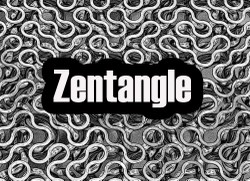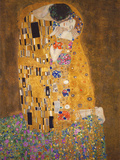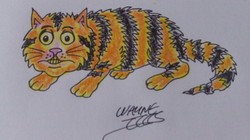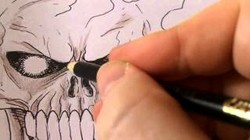The word Zentangle comes from a combination of 'zen' meaning calm, relaxed attitude and 'tangle' the intertwining of shapes and forms. The purpose of this article is to outline what you need to get started on a Zentangle adventure. Therapeutic in nature, this versatile art form will draw in everyone in your family network.

How to Zentangle
by Jo_Murphy
Zentangle is a form of relaxation and an attractive style of art inspired by the subconscious. If you can doodle when you are on the phone, you can do this style of art.
Materials
With all of the self publishing tools available across the world today both on the Internet in digital form, and in readily accessible personally designed and created gift stores, Zentangle has become a way for people to convert their relaxation into a perfect medium for communicating.
You can use the artwork you create to show you care and perhaps even make a little money.
The Zentangle Method is easy to learn and it is comparatively easy to produce effective results. It is also relaxing and therapeutic. Have fun while you create intriguing images that are drawn from intuitive but highly structured patterns.
If you give yourself over to this process, you will find that you will enjoy increased focus and a burst of sustained creativity.
You will need
- art paper
- pencils
- marker pens
- geometric implements such as a protractor, compass. ruler and other guides
- a variety of art materials of your choice
How to get started with Zentangle
Keeping it simple at the start
The first example featured in the video below is called Zentangle Circles. Pretty easy. Fill the page with circles using a compass or freehand and then fill each circle with patterns. I suggest this is a great way to get started. It is a 'no brainer' and yet the technique can produce beautiful results. Use a pencil when beginning (2B) and then when ready change to a black fine tipped felt pen. Use colour pencils or paint to work into the design with colour.
Zentangle lesson uploaded by Tiffany Lovering
A More Complex (but still easy) Pattern
In this video Mrs Crosby, an art teacher, shares how she goes about achieving quite complex Zentangle patterns. She suggests taking copies of your black and white work before applying colour. As you will notice from the comment on the lest example, some people liked the work a lot more before colour was added - so why not keep a black and white version as well?
In this video you will see Mrs. Crosby talking about how to blend sections of the work to create a three dimensional effect.
A Lesson on Zentangle by Mrs Crosby
Doodle Flowers Explosion (Doodle Drawing 3)
Gemini Jenny
Becoming More Complex
Gemini Jenny
Once you have become used to feeling your way through the blend of geometric patterns mixed with tangles of organic lines, you will find a style of your own. It is at this stage you will start to think about what you can do with these designs. Zazzle has an enormous array of products onto which you can burn these digitally imaged designs.
You can make birthday and christmas presents for members of your family. The images and patterns can be burned onto jigsaws, coffee mugs, children's pencils cases. Click the link below and browse the ways the designs could be used.
To get started simply sign up on Zazzle.

Click Create to start burning your own personal designs onto these products.
Follow the prompts being sure to follow instructions about file size and quality.
If you would like to turn your designs into JigZone Email Jigsaw Cards read this article.
Looking for More Art and Craft Articles
Try these.......
You might also like
How To Draw A Cartoon CatHow to draw a cartoon cat step by step with step by step illustrative photo s...
How To Draw A Ghost Rider Skull Step By StepDrawing a Ghost Rider skull step by step in three long drawing tutorial art v...






 As We Age - We React to Life's Challenges Differentlyon 03/16/2024
As We Age - We React to Life's Challenges Differentlyon 03/16/2024
 Organic Gardening - Cunnamulla Styleon 03/08/2024
Organic Gardening - Cunnamulla Styleon 03/08/2024
 Cunnamulla - Premium Destination Outbackon 12/17/2023
Cunnamulla - Premium Destination Outbackon 12/17/2023
 OpenAI and Watermarkson 02/06/2024
OpenAI and Watermarkson 02/06/2024



Comments
Now that I have taken up Travel Writing with such gusto _ I think I will get to Hawaii
Had you gone to Hawaii and mastered wave-painting, perhaps you might have become involved with Dr. Haunani-Kay Trask's Hawaiian culture program at the University of Hawaii at Manoa on Oahu island.
Dr. Trask set up an accurate, exciting, practical, thorough, timeless, timely curriculum on both the undergraduate and the graduate levels.
But perhaps it would have benefited -- and still would benefit, despite Dr. Trask's death July 3, 2021 -- from a permanent or a visiting professor such as you proficient in Hawaiian art and in its teaching.
I will need to read this thoroughly and give a better-informed answer than I could right now!
When I was young I wanted to go to Hawaii and learn to paint waves properly from the local folk.
The computer crashed before I could complete my comment two boxes below.
The Hawaiian-culture, Hawaiian-language Kamehameha Schools developed the Kakaako neighborhood. Kakaako developed on the beloved, traditional salt-marsh lands where ancient Hawaiians grew, traditional Hawaiians grow pili grass for thatching their homes, from the humblest to the royalest.
That's why the neighborhood is known as Kakaako (from Hawaiian kaka 'ako, "to thrash [the pili grass] for thatching [houses]").
Kakaako building and street walls let street art survive and thrive even as the whole neighborhood offers ancient and traditional arts and crafts and going-ons.
Punahou School, which President Obama attended, may be considered an equivalent of Kamehameha Schools, which activist, author, educator, poet and professor Haunani-Kay Trask attended.
huh?
Yes, that link gives a nice presentation of Kakaako (from Hawaiian kaka 'ako, "to thrash thatching" from salt marshes where pili grass, for thatching ancient and traditional houses, grew
https://ourkakaako.com/street-art/
Is this what you mean?
The "children's mural" and the "easy kids stuff" are among what most delight and inspire me -- in terms of aesthetics-appreciating since I ain't no artist -- from the street art of the Kakaako neighborhood of Honolulu on Oahu island in Hawaii state!
I do a lot of portraiture but right now I am working on a children’s mural. You would be surprised how much easier it is to opt for the easy kids stuff. But I am always drawn back to the backbreaking work of portrait.
Guided and spontaneous art both can produce creative forks.
An artistic creation sometimes goes one way, then hits an intersection involving two, two-plus interpretations.
Is it more comfortable, more organized, more productive to opt for one and not pursue the other at all or to proceed with one but preserve notes (just in case the alternative surfaces pleasingly, productively elsewhere during another creative session)?